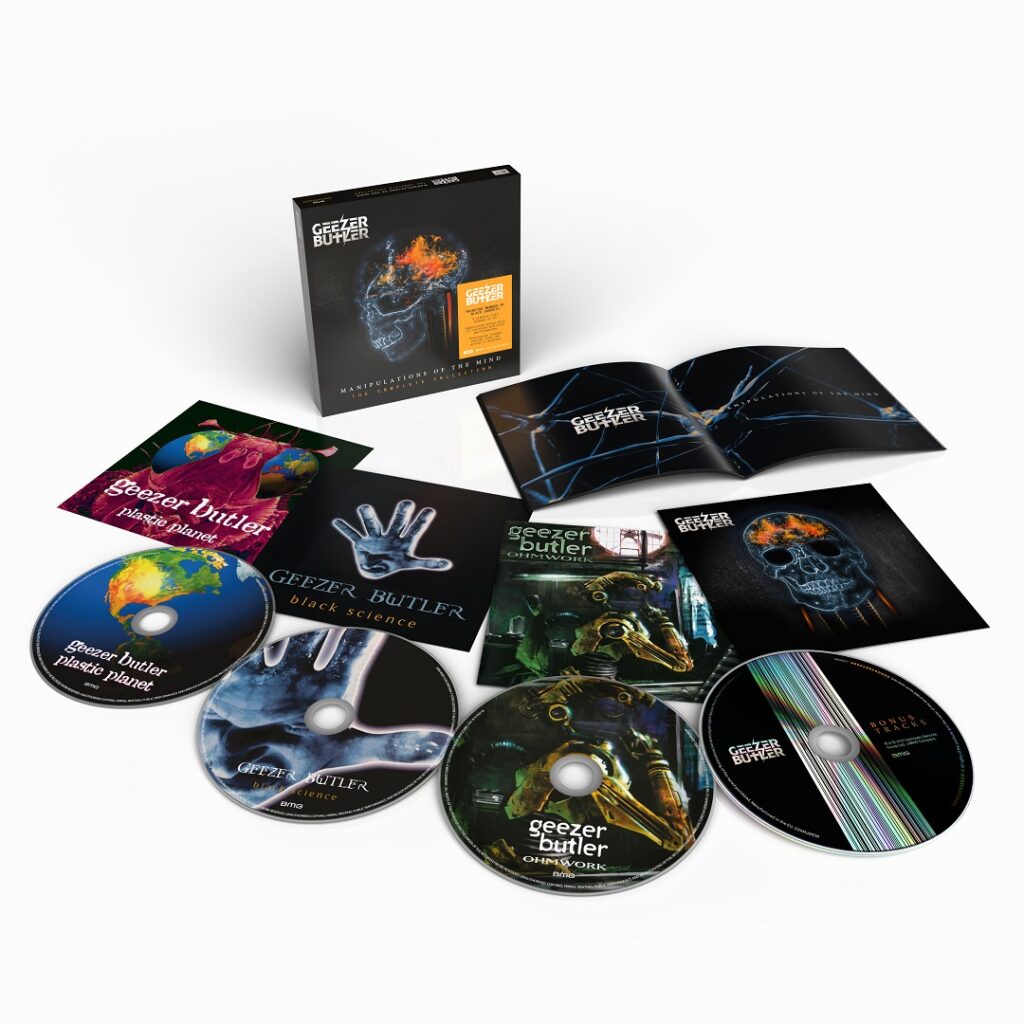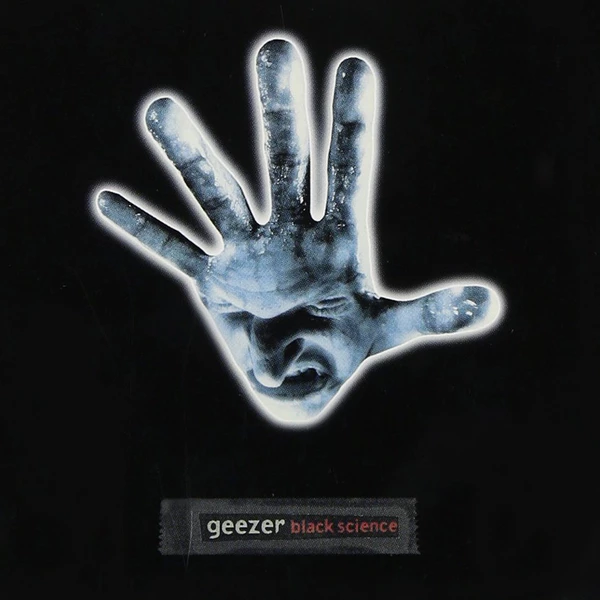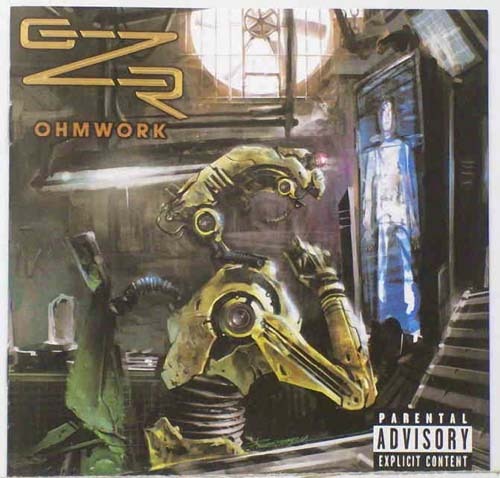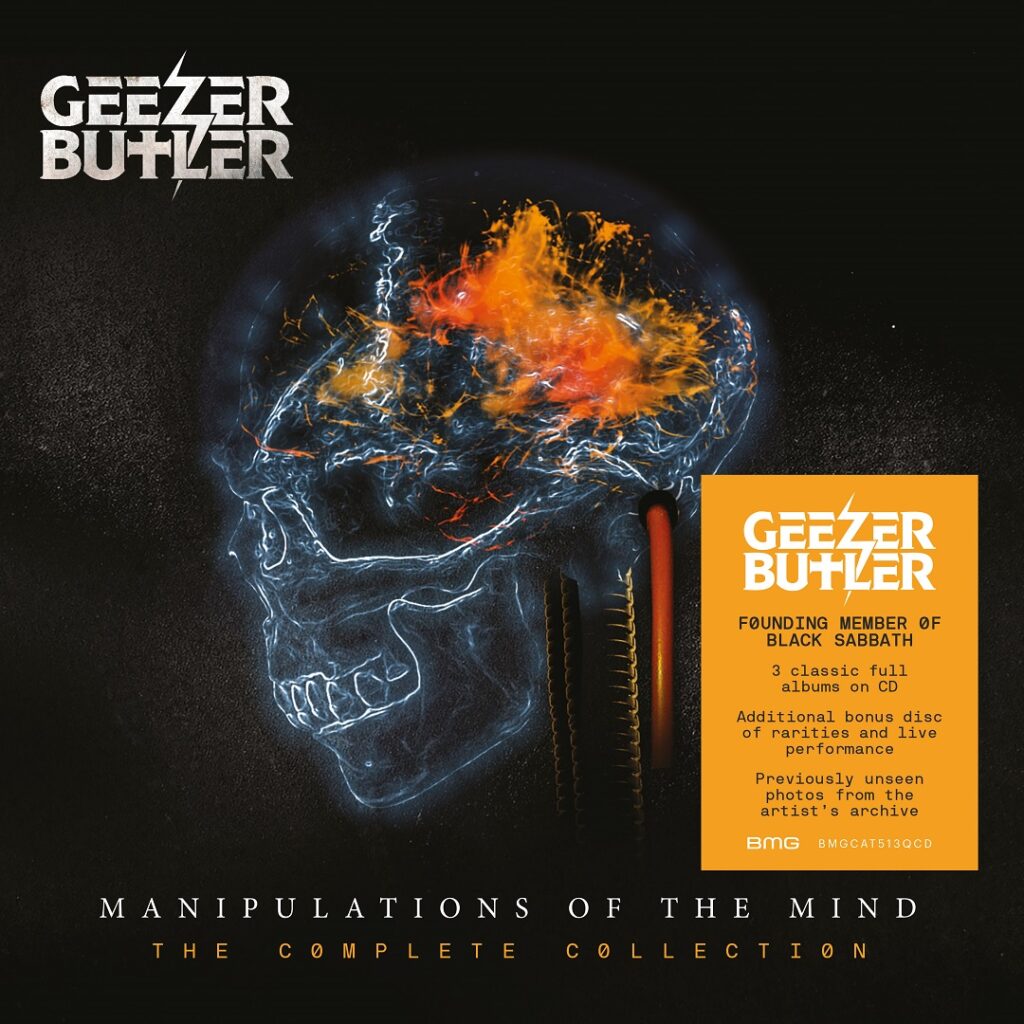
Celebrating the short, but powerful solo career of Black Sabbath’s Geezer Butler, BMG are poised to release both a comprehensive box set and a condensed, seventeen-track best of. This review covers the four-disc box set, Manipulations Of The Mind, which gathers together the three albums Geezer released between 1995 and 2005, alongside a bonus disc of rare and unreleased material.

Packaging & contents
As is becoming increasingly common with this sort of archival release, Manipulations Of The Mind comes housed in a hard, clamshell case with a newly designed front cover and the track-listing for all four albums on the back. Inside, the CDs are housed in simple card cases, while a separate booklet provides images from the various recording sessions.
Unfortunately, while the packaging is attractive, whoever compiled the set forgot to include any liner notes whatsoever, which means that the listener is left predominantly without credits for the albums, the exception being Ohmwork, which must have been a single-sleeve vinyl in its original incarnation and, therefore, has full sleeve notes on the rear. It’s a misstep, and it’s a great shame that neither contextual essay nor liner notes were thought important for such a set.
With regard the albums themselves, each is provided in vanilla form, with no obvious remastering having taken place. As such, beyond the fourth disc, there is little to entice long-term fans, making this rather more for those who missed out on Geezer’s efforts the first-time round, although completists might be tempted by the fifteen-track bonus disc, which comprises a mix of alternate takes, radio mixes, demoes and live tracks, many previously unreleased.
The Music

Plastic Planet (1995)
In 1995, Geezer found himself drawn to the brutal yet melodic cyber metal of Fear Factory and Ministry and it surely shows. Recruiting Fear Factory’s Burton C. Bell on vocals, Peter ‘Pedro’ Howse (the one constant across the sets) on guitar and Deen Castronovo on drums, Geezer set about making a blistering album that still sounds surprisingly contemporary today.
Opening with the super-charged doom of Catatonic Eclipse, you can sense Geezer’s passion for exploring different forms of heavy and, with Deen’s inventive percussion driving the track, it’s hardly surprising that a young Burton found himself at home amidst the industrial-strength riffing. Burton excels on tracks like Drive Boy, Shooting, a piece elevated by his throat-ripping performance. Just in case you thought it couldn’t get any heavier, Giving Up The Ghost is there to disabuse you of the notion, and the churning hell of the rhythm section easily stands as one of the album’s heaviest moments, despite a melodic chorus. The title track’s dystopian lyrics feel especially prescient given the current global situation and its backing is suitably apocalyptic, while the stabbing alt-metal of The Invisible, sees the churning bass and stop-start riffing recalling Helmet in their prime.
With his love of punning titles fully intact, Geezer opens up the album’s second half with the menacing Seance Fiction. Opening in a wash of synth noise, the track steadily builds into a Sabbath-esque wall of doom that sees a relentless, Iommi riff sitting comfortably amidst the cyber-trappings of Paul Northfield’s production. In contrast, House Of Clouds forms a sonic battering ram, as primal as anything Ministry were employing during the same period. Similarly vital, albeit with a cleaner production, Detective 27 is cyber-noire with jazzy undertones – a pairing that works incredibly well. The Sabbath vibe returns on the thudding X13, Burton employing a more Numan-esque vocal that would become increasingly common in Fear Factory’s work from Obsolete onwards. Daffy title aside, Sci-clone is a punchy number that maintains the high standard of the album, only for the gentle psychedelia of Cycle Of Sixty to see the album out with a sound that harks back to Sabbath’s Volume 4. After the punishing brutality of the preceding ten tracks, it feels a tad incongruous to say the least although, at under three minutes in length, it’s less a standalone track than a coda to an unexpectedly potent debut.
With Burton C. bell on board, comparisons to Fear Factory were always inevitable. However, Plastic Planet is more than just a veteran musician seeking inspiration from his younger peers and, alongside Fear Factory’s cyber groove, influences from both the Sabbath mothership and Ministry can be found. A strong solo debut, with intelligent lyrics and committed performances, Plastic Planet showcased Geezer’s strengths as a songwriter, while his instinctive desire to push beyond the boundaries of his own, genre-leading outfit, proved to be well-founded. 9/10

Black Science (1997)
Just two years later, Geezer returned with another shot of potent metal. With Pedro and Deen back on board, Burton was sadly unable to join the party due to commitments with Fear Factory. Instead, Geezer turned to an unknown singer named Clark Brown. If Clark was daunted by such an opportunity, it certainly doesn’t show, and his assured performance keeps pace with Geezer’s crack band every step of the way.
The album opens to the sound of ominous synth and, when the band unleash the tungsten-plated riff of Man In A Suitcase it’s clear they mean business. With Clark pitched somewhere between Rob Halford and Geoff Tate on the opening number, he’s a very different proposition to Burton’s gruff delivery, and it draws the album away from the full-on cyber assault of its predecessor. It’s a powerful start, only for the bruising Box Of Six to pull an abrupt switch as Clark toughens up his delivery to sound eerily like a young Hetfield over a riff that wouldn’t sound out of place on a Pantera album. Something of a highlight, the eerie NIN-isms of Mysterons recalls Halford and Reznor’s ill-fated (and underrated) Two project. The synth-heavy Justified once again sees Clark unleashing that Hetfield roar, the resultant track sitting somewhere between Paradise Lost’s electronic digressions and Load. Arguably less successful is the grind ‘n’ groove of Department S, which feels like a track written with Burton in mind, and it just does not connect with the force you might expect. More natural is the Sabbath-y Area Code 51 which, despite its cyber-flourishes, has an organic chorus that is both heavy and surprisingly catchy. Rounding out the album’s first half, Has To Be also works well thanks to a more stripped down approach, with Pedro’s toughened chugging providing plenty of weight behind Clark’s harmonised vocals.
The most unexpected track on the album is surely the neo-classical grind of Number 5, an industrial experiment that sounds genuinely unlike anything that was being put out back in 1997. Ahead of its time, it brings together a number of disparate elements and holds them in place with a relentless, metronomic beat, before finally exploding some three-and-a-half minutes in. In contrast, the slow burning Among The Cybermen has a dark, Alice in Chains vibe that suits Clark’s voice well, although there is some justification over treating the bizarre Unspeakable Elvis with a little more caution. A strange mishmash of ideas, it has some cool riffs, but is stylistically all over the place otherwise. Fortunately, the synth-enhanced Xodiak is on hand to keep things moving forward effectively, leaving the drum ‘n’ bass of Northern Wisdom to lead us to the clanking, industrial Trinity Road, another track that appears to throwback to the Burton era.
Black Science is something of a strange album. Caught between the cyber-futurism of Burton’s tenure, yet drawn to more traditionally metallic pastures by Clark’s impressive vocals, the result is a record that bridges the two worlds. It’s mostly successful, although the album as a whole is arguably two songs over its fighting weight but tracks like Number 5 or Mysterons are more than worth the price of admission. 8/10

Ohmwork (2005)
As Sabbath reunited in 1997, it was eight years before Geezer returned with the ludicrously titled Ohmwork. With the ever-faithful Pedro on board, Geezer wisely bought Clark back to the fray, while veteran St Louis drummer Chad E. Smith (not from RHCP) came on in the place of Deen. Stripping away the industrial elements of his previous two works, Geezer’s final solo album finds the bassist in thrall to nu metal and, although the opening tracks have a looser groove, a large proportion of the ten tracks on offer are infused with the sludgy rhythms of acts such as Korn and Mudvayne, with varying degrees of success.
Initially, you’d be forgiven for thinking Ohmwork was going to head into more traditionally metal territory, as it opens with the hard-driving metal of Misfit. With those AiC elements previously visible on the likes of Among The Cybermen, once again used to good effect, Geezer’s bass roams at will through the hulking riffs and layered vocals, making for a strong start. The signs of a contemporary shift are there, however, when the schizophrenic Pardon My Depression pairs Alice in Chains with Mudvayne, as Geezer unleashes huge, palm-muted swathes of guitar and a wonderfully incongruous, bluesy bass line. From there, things take a more nu metal turn and, reminding us of bands like P.O.D, Prisoner 103 offers a fully-fledged rap vocal. To be fair, Geezer and his band make a pretty convincing fist of it, only to lob another curveball in the form of the acoustic I Believe, an atmospheric piece that initially feels jarring in contrast with what went before. The first half ends with the ridiculous pun of Aural Sects, a fast-moving piece that harks back to the opening pair of tracks, and it seems a little strange that so traditional a track would be included at this point in proceedings.
Opening the second half of the record, Pseudocide, with its split vocal featuring Lisa Rieffel, is a raucous nu metal number that gets the blood pumping. It’s followed by the hip-hop-infused Pull The String, another track that would sit comfortably alongside the likes of P.O.D or (whisper it) Limp Bizkit at their heaviest. In contrast, the dense Alone is arguably the closest this album comes to the industrial-strength material found on the previous albums, and it provides a clear highlight, despite its baffling omission from the best of collection. With the album hurtling past, the Mudvayne-isms of Dogs Of Whore see the track built around a scything, unconventional riff, before the stuttering Don’t You Know brings back the hip hop infused vocals for one last pulverising hurrah.
More concise than Black Science, Ohmwork clearly longs to run with the nu metal set, and yet muddies the waters with a handful of more traditionally metal pieces Tracks like Misfit, while fine in their own right, just sound odd when stacked next to the nu metal-infused Prisoner 103, and the album as a whole is a strange affair, often enjoyable, but not particularly coherent. Arguably the weakest of the three albums, Ohmwork still has much to recommend it but, where Plastic Planet led the pack, Ohmwork feels more like he’s following gamely along. 7/10

Bonus Tracks
The bonus disc offers fifteen rare tracks in total and, as you might expect, it’s a bit of a mixed bag. Rather oddly sequenced, the disc is neither organised chronologically nor according to track type, with the result that the disc moves awkwardly from instrumental takes to radio mixes via demos and rough mixes. It does, at least, group together the three live tracks on offer at the end of the disc but, overall, it’s a strange, albeit compelling beast.
Opening the disc, Pseudocide (no intro) removes the ten-second introduction of its original incarnation, to leap straight into the fray. A brutal opener, it arguably surpasses the original, coming across as far rawer in this incarnation. An alt take of the hip-hop heavy Prisoner 103 is, again, a touch dirtier than the final take, but more interesting is an instrumental version of The Invisible, which practically makes you feel like you’re in the studio with the band as they lay it down. That sense continues on the ethereal demo version of Area Code 51, which moves from synth-infused opening to rough-as-hell metal, showcasing just how dark the original outline for Black Science was. A couple of radio mixes follow, for the dreamy Cycle Of Sixty and crunchy X1, with neither adding much to the originals. However, a demo version of Black Science’s Northern Wisdom offers further insight into the creation of the album, once again showing just how fully-fledged the ideas were before studio polish was added.
A particular bonus is the rare track Beach Skeleton, originally only available on the Japanese version of Black Science. It’s a cool track with a potent industrial stomp, and definitely one for the collectors. An alt take of Ohmwork highlight Pardon My Depression has a Stone Temple Pilots vibe, with Clark’s vocal sounding darker and heavier than the final version. Meanwhile, a rough mix of Misfit (from the same album) gives the track a much more obvious Sabbath vibe that does it few favours. A demo version of I Believe opens a truly fascinating window into the creative process of Ohmwork, with its synth drum beat and reverb-drenched vocals touching on My Bloody Valentine, while Four Feathers Fall is even more interesting, as it’s a demo of an unreleased piece. Built around similar synth sounds to I Believe, these two demos suggest that Ohmwork started out its life in a very different form to its final version, and it’s a tantalising glimpse into an alternate reality, where Geezer engaged more with shoegaze and psychedelia than nu metal on that final record. The bonus disc winds up with three, live tracks. They’re rather bootleg quality, but it’s great to hear Geezer and his band power through tracks from career highlight Plastic Planet, including the devastating Drive Boy, Shooting, a Rollins-esque Detective 27 and, finally, a full-throttle House Of Clouds (Live).
As noted, the bonus tracks don’t necessarily flow terribly well as a record, given the mishmash of differing sources and track types, but it does offer some real gems. The demo versions (particularly the pair of demos from Ohmwork) are genuinely interesting, while the rare Beach Skeleton is definitely a treat for completists unable to get hold of the Japanese version of Black Science. Last, but not least, the live versions, while a tad rough and ready, capture Geezer on the road with Burton, performing tracks from the awesome Plastic Planet, and these are worth having for rarity value alone. Overall, a most worthy bonus disc, then, that has more than enough to delight geezer fans. 8/10
Overall
Like Ozzy, Geezer always seemed more switched on to what was happening around him in the metal world than many of his peers, which means that each of his three albums fit comfortably alongside albums made during a similar period. His masterpiece is the searing Plastic Planet, an album that makes fantastic use of a young Burton C. Bell’s talents to take on the likes of Fear Factory and Ministry at their own game. Less successful is Black Science which, despite the talent on display, simply feels too long. Drop two or three tracks and Geezer would have had another winner on his hands but, as it stands, it’s a decent album with a touch too much filler to truly rub shoulders with its illustrious forebear. The weakest of the bunch, Ohmwork, simply sounds too much like it was following the leader at a time when nu metal was already waning, although there are a still a number of cracking tracks to be found. Overall, if you don’t have these albums already, there is more than enough to keep you entertained for a few hours, while the bonus disc is a treasure trove of rare and previously-unreleased material that will have Geezer fans in raptures. Sadly, the packaging loses a number of marks for its absent information, which is a shame because the archival images, new artwork and clamshell box are otherwise attractive, but there’s certainly enough here for Geezer fans to justify shelling out.
Music: 8.5/10
Packaging 5/10



